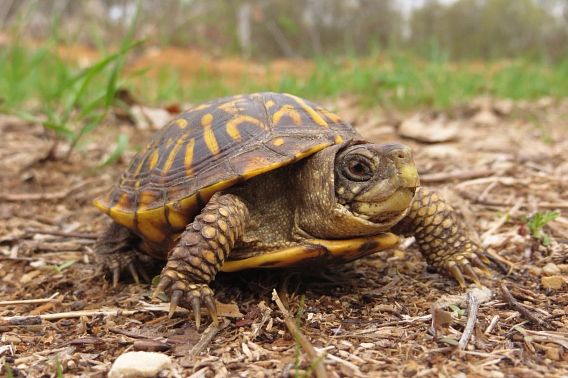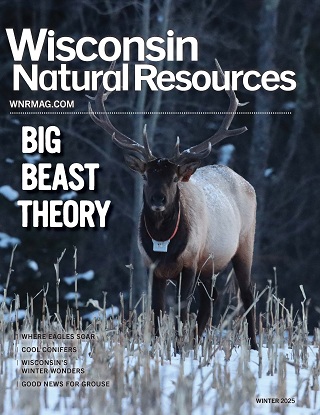Contact: Andrew Badje, DNR Natural Heritage Conservation Biologist
Andrew.badje@wisconsin.gov or 715-921-5886
Help Protect Turtles During Wild Turtle Week
Build A Nest Cage, Report Road Crossings And Keep Wild Turtles Wild
 Ornate box turtles are often found in the pet trade, however, they are endangered in Wisconsin and are illegal to take from the wild and own as pets.
Photo credit: Wisconsin DNR
Ornate box turtles are often found in the pet trade, however, they are endangered in Wisconsin and are illegal to take from the wild and own as pets.
Photo credit: Wisconsin DNR
MADISON, Wis. – The Wisconsin Department of Natural Resources (DNR) encourages Wisconsin citizens to give turtle mothers and the next generation of turtles a helping hand during Wild Turtle Week, May 23-27, and throughout nesting season.
This time of year, turtles begin to emerge from rivers, lakes and wetlands to lay eggs. Wisconsin’s 11 turtle species lay eggs in nests from late May through June in sunny areas and well-draining uplands. This annual nesting migration often puts turtles on roadways and in residential areas. Many females are run over by vehicles during this period, a leading cause of turtle decline in Wisconsin.
Turtle nests are also exposed to high levels of predation as populations of nest-raiding animals such as raccoons, skunks and coyotes grow to historical numbers. The current demand for pet turtles is also a significant issue, leading to the illegal removal of our native, North American turtles from our wild places.
“The nesting season is a tough time for wild female turtles. Many are removed from populations through road mortality, while others are collected, often illegally, for the global pet, food, and medicine industry,” said Andrew Badje, DNR Conservation Biologist. “Protecting female turtles and their nests in the wild and learning how pet turtle demand influences an unsustainable illegal turtle trade are great ways to conserve turtles in Wisconsin and the world.”
Additionally, some Wisconsin turtles must reach old ages and participate in many nesting seasons to reproduce successfully. Blanding’s turtles and wood turtles cannot reproduce until they’re 12 to 20 years old, while others, like ornate box turtles, lay only a few eggs a year. Therefore, removing even one female turtle per year can quickly lead to population declines or the elimination of local populations.
The DNR encourages those interested in helping turtles to consider following these protective actions from now until the end of summer:
- Protect turtle eggs in yards and other private property by building and securing a nest cage over any documented nests. Follow these instructions and watch a step-by-step video to build a nest cage that keeps predators away from the nest and allows hatchlings to exit on their own.
- Drive with caution on roads that are near wetlands, lakes and rivers. Slow down and be alert.
- Report turtle observations, road crossings and nest sites using the Turtle Reporting Form for the DNR’s Wisconsin Turtle Conservation Program. DNR conservation biologists use these reports to manage and conserve turtles.
- Report suspicious or illegal activity associated with turtles to DNR’s Violation Hotline by calling or texting 1-800-847-9367.
- Help protect Wisconsin’s native turtles by keeping wild turtles in the wild and not releasing pet turtles into the wild.
- Turtles don’t make great pets. For those desiring to own one, #BuyInformed, and take steps to lessen the impact on the illegal turtle trade.
- Learn additional ways to help protect Wisconsin’s turtles and spread the word about Wild Turtle Week.

